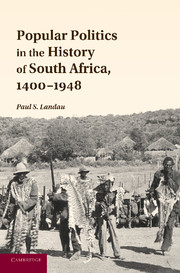Book contents
- Frontmatter
- Contents
- List of Figures
- Preface: The Birth of the Political
- Acknowledgments
- 1 Eyewitness Engagements (Highveld political discourse at the start of the 1800s)
- 2 History before Tribes (Partnership, alliance, and power)
- 3 Translations (Missionaries and the invention of Christianity)
- 4 The Incipient Order (Moroka's reign, 1828–1880)
- 5 Mixed People (The Samuelites, the Griqua, and other subjectivities, 1880–1928)
- 6 Twentieth-Century Tribes
- Primary and Archival Sources
- Bibliography
- Index
- References
1 - Eyewitness Engagements (Highveld political discourse at the start of the 1800s)
Published online by Cambridge University Press: 04 August 2010
- Frontmatter
- Contents
- List of Figures
- Preface: The Birth of the Political
- Acknowledgments
- 1 Eyewitness Engagements (Highveld political discourse at the start of the 1800s)
- 2 History before Tribes (Partnership, alliance, and power)
- 3 Translations (Missionaries and the invention of Christianity)
- 4 The Incipient Order (Moroka's reign, 1828–1880)
- 5 Mixed People (The Samuelites, the Griqua, and other subjectivities, 1880–1928)
- 6 Twentieth-Century Tribes
- Primary and Archival Sources
- Bibliography
- Index
- References
Summary
Over the centuries, in the middle of what eventually became South Africa, hundreds of thousands of people lived and labored. They were farmers and livestock-keepers, warriors and poets. They spoke the same language, or incrementally distinguishable dialects of it; they moved about among themselves, married one another, and ranked their princely houses together.
Theirs was a history of settlement on verdant hills, of men and women building a world of ranked communities with cross-cutting loyalties and long-range connections to the Limpopo basin to the north, and the foothills of the Drakensberg range and the grasslands to the east. As the highveld's agrarian towns expanded, they brought together into their midst households, and sometimes whole communities, from the wider world. Most professional travelers could make themselves understood with little effort. Prestigious healers and specialists in rituals, rain-makers, militia-scouts, and cattle-herders covered great distances; women often married away from home, sometimes far away. As a result, authority and culture were disposed across the highveld and its enclosed river valleys in a widely comprehensible tradition, shading up even onto the Zimbabwean highlands on the northern side of the Limpopo Valley. Within this context developed multiethnic chiefships and chiefly partnerships.
Most accounts of South Africa's past summon up a different picture from this, however: a world of tribes. Tribes may be designated ethnic groups, or peoples, but the treatment is the same. In its purest form, the tribe constitutes the claim that popular mobilizations among African people were apolitical, customs-determined phenomena.
- Type
- Chapter
- Information
- Publisher: Cambridge University PressPrint publication year: 2010



